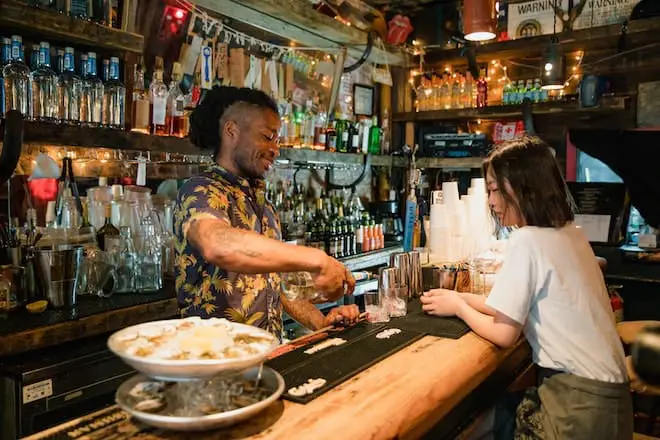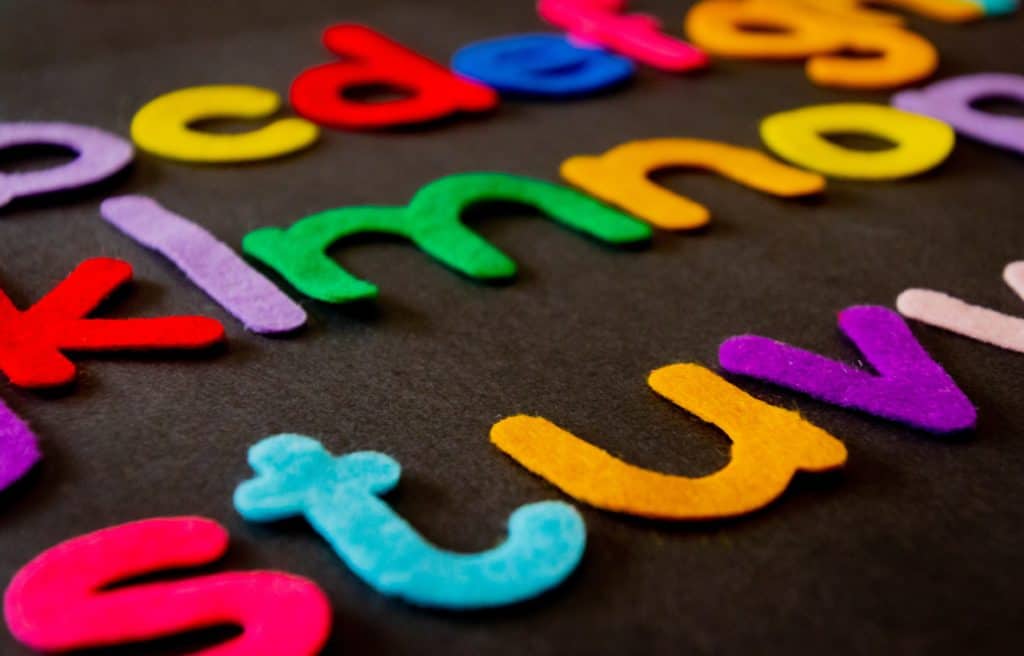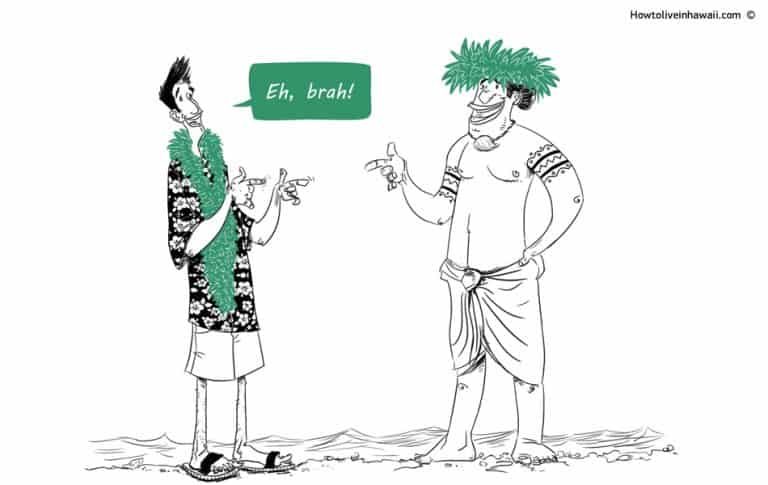Are you planning a visit to Hawaii, or are you just interested in learning about the local culture? Either way, understanding Hawaii Pidgin Slang can be helpful.
In this post, we’ll go highlight the most useful Hawaiian Pidgin Slang words and phrases so when you arrive you’re fully prepared to meet some kanaka’s (kah-NAH-kah) or Hawaiian People and jump right into Hawaiian culture.

Most Popular Hawaii Pidgin Slang Words
This is a short list of those words that are a MUST-HAVE if you are planning to visit or move to Hawaii. You’ll here these words daily and will understand a lot more if you know these words!
Aloha – Absolutely the most popular Hawaiian word that any foreigner is bound to have heard before! It means both hello AND goodbye.
brah – Short for braddah or bruddah (“brother”). A casual, friendly way of addressing a male: Eh, brah — you wanna go surf?
da kine – A catch-all phrase that is often used to fill in a mental blank when talking, similar to “whatchamacallit”: Let’s go to da kine place we grind at last week.
grind – Eat.
grinds – Delicious food.
haole (HOW-leh) – Traditional meaning: Foreigner. Modern meaning: Caucasian (not deragatory).
hana (HAH-nah) – Work.
hapa (HAH-pah) – Part, half (for example, hapa haole). Someone of mixed racial or ethnic heritage, especially involving Asian or Pacific Islander heritage.
howzit – A greeting, equivalent to “How are you?” or “How is it going?”
kahuna (kah-HOO-nah) – A priest or expert.
mahalo (mah-HAH-low) – Thank you.
maika’i (my-KAH-ee) – Excellent, good.
kapu (KAH-poo) – Forbidden, taboo, keep out.
‘Ohana (OH-hah-nah) – ‘Ohana means family and like most cultures plays a major role in Hawaiian life so you’ll likely hear this Hawaii Pidgin Phrase!
talk story – To chat or gossip. To reminisce with friends.
More Hawaiian Pidgin Slang Words and Phrases
Understanding Hawaiian Pidgin Slang is an important part of immersing yourself in Hawaiian culture.
These phrases are used daily by locals, and knowing them will help you communicate and connect with people on a deeper level. From greetings and goodbyes to food and drink, there’s a wide range of Hawaiian slang phrases to learn.
Start practicing before your trip to Hawaii, and get ready to impress the locals with your newfound knowledge. Aloha!
Common Greetings & Goodbyes
a hui hou (AH HOO-ee HOH) – Goodbye.
e kala mai (EH KAH-lah MY) – Excuse me, sorry.
e komo mai (eh COH-mo MY) – Welcome, come inside.
jalike? (jah-LYK) – “Do you want to?”
‘k den – An expression of farewell, equivalent to “OK, then — goodbye.”
Culture and History-Related Hawaii Pidgin
Aloha Fridays – Similar to “casual Fridays” on the U.S. mainland, during which employees are allowed to dress more casually or in aloha wear, in anticipation of the weekend.
auntie – A respectful term for a woman who is of your parents’ generation or older: The aunties have volunteered at the school for many years. A respectful way to address such a woman: Can I help you carry that, auntie?
Complimentary and Derogatory
akamai (AH-kah-MY) – Smart, clever, wise, witty, skilled.
bumbai (bum-BYE) – Short for “by and by.” Otherwise, or else, eventually: You bettah study bumbai you flunk da test tomorrow.
broke da mouth (broke dah mowt) – Extremely delicious: Dis Potagee soup broke da mouth, auntie!
buss you up or all buss up – To fight and win, or hang one on drinking.
chang – Miserly, overly frugal: C’mon, gimme some more, brah — you so chang!
Ethnicity and Nationality-Related
ali’i (ah-LEE-ee) – In Native Hawaiian history, someone of inherited nobility (the highest social class).
borinkee – A person of Puerto Rican descent.
buk buk (book book) – A person of Filipino descent (see also manong).
pocho – A person of Portuguese descent. (See also potagee.)
popolo – A dark-skinned person of African descent.
kumu (KOO-moo) – Teacher (as in kumu hula).
kanaka (kah-NAH-kah) – A person of Native Hawaiian descent.
potagee (POH-tah-gee) – A person of Portuguese descent. (See also pocho.)
Manong (MAH-nong) – A person of Filipino descent (see also buk buk).
sole (SO-leh) – A person of Samoan descent.
yobo – A person of Korean descent.
kama’aina (KAH-mah-EYE-nah) – “Person of the land.” Long-time resident. (Note: Kama’aina discounts apply to any resident of Hawaii, regardless of how long they’ve lived here.)
Food and Drink
imu (EE-moo) – Underground oven or roasting pit.
kau kau (KOW kow) – Food, eat.
‘ono (OH-noh) – Delicious
Geographical
aina (EYE-nah) – Land, especially homeland.
makai (mah-KIE) – Toward the ocean.
vog – smog or volcanic fog
Items and Words for Specific Things
gadut – So, what’s the deal with the word ‘gadut’? It’s a fun little term that can mean different things depending on where you are! In some places, it’s all about a lively dance or catchy music that gets everyone moving and grooving. In other contexts, ‘gadut’ might refer to a cool craft technique or a delicious dish that brings people together. Whatever the case, diving into the meaning of ‘gadut’ is like opening a treasure chest of culture and creativity—definitely worth a look if you’re curious about the world around you!”
hale (HAH-lay) – House.
lanai (lah-NIE) – Patio, balcony, porch.
lua (LOO-ah) – Toilet, restroom.
mahu (MAH-hoo) – Homosexual or transgendered (not derogatory).
fadda (FAH-dah) – Father
honu (HOH-noo) – Turtle or tortoise.
rubbish – Trash, garbage.
‘okole (OH-koh-leh) – Buttocks.
opala (oh-PAH-lah) – Garbage, trash, litter.
kalani (kah-LAH-nee) – Heaven.
hoku (HOH-koo) – Star.
kai (KIE) – Ocean.
wagon – Shopping cart.
Miscellaneous Hawaii Pidgin Slang
aloha shirt – Also known as a “Hawaiian shirt” on the U.S. mainland.
chicken skin – Goosebumps: Dat ghost story always give me chicken skin!
da cute (dah cute) – The cute! Or just cute in general
eriding (EHR-ree-dihng) – Everything
eh? – “You know” like, “Big waves Eh?”
eh heh – You know that little sound “eh heh”? It’s one of those casual expressions that people use when they’re feeling a bit awkward or just trying to lighten the mood. It’s like a playful way to say, “Oops, that was a little weird!” or “Let’s not take this too seriously.” Understanding the meaning of “eh heh” can really help you get the vibe in casual chats, whether you’re texting your buddies or hanging out in person.
ewa (EH-vah) – Leeward, westward. (Note that the “w” is pronounced like a “v”.)
futsetta (fuht-SEH-tah) – A female monster like a witch used for misbehaving children: “Be a good girl or futsetta’s going to come”
geev’um (GEEV uhm) – “Go for it!”– or –“Give it to them.”
halau (hah-LOW) – School, group (as in halau hula).
hana hou (HAH-nah HOH) – Encore, do it again.
hapai (hah-PEYE) – Pregnant.
hele (HEH-leh) – To go, leave.
holoholo (HOH-loh-HOH-loh) – To go out visiting; to go out for a walk or ride.
honi (HOH-nee) – Kiss.
hui (HOO-ee) – Club or organization, especially for business purposes.
iki (EE-kee) – Little, small.
kane (KAH-neh) – Man, boy.
katonk or kotonk (kah-TONK or koh-TONK) – A person of Asian descent born and raised on the U.S. mainland.
kupuna (koo-POO-nah) – Respected elder, ancestor, adopted grandparent or great-aunt/uncle.
keiki (KAY-kee) – Child.
kokua (koh-KOO-ah) – Help, assist.
kuleana (koo-lee-AH-nah) – Responsibility.
ku’uipo (KOO-oo-EE-poh) – Sweetheart.
lani (LAH-nee) – Heavenly.
like beef? – An invitation to fight, equivalent to “You wanna step outside and settle this?” (see also scrap).
lokahi (loh-KAH-hee) – Unity, harmony, in agreement, peace.
lolo – Stupid, absent-minded, crazy. Moron, imbecile.
lu’au (LOO-ow) – Feast, party.
luna (LOO-nah) – Boss, foreman, overseer.
malihini (MAH-lee-HEE-nee) – Newcomer.
Mayjah (ma-y-jar) – What does ‘mayjah’ really mean in Hawaiian? Well, it’s all about that sense of greatness and importance! In Hawaiian culture, this word captures the vibe of excellence and the strong sense of community. When you dive into the meaning of ‘mayjah,’ you’re not just learning a new word; you’re also getting a glimpse into the rich and vibrant traditions of Hawaii. It’s a fun way to connect with the culture and appreciate all the little things that make it so special!”
mauka (MOW-kah) – Toward the mountain.
maile (MY-lay) – A native Hawaiian vine with dark-green aromatic leaves that is used to make an open-ended lei that is draped around a person’s shoulders. This type of lei is usually reserved for very special occasions, like weddings, graduations, and proms.
make (MAH-kay) – Dead.
malama (mah-LAH-ma) – To take care of.
mana (MAH-nah) – In Polynesian culture, a supernatural or sacred force that can inhabit people, places, and things, thus giving them authority and power.
mauna (MOW-nah) – Mountain.
mele (MEH-lay) – Song or chant.
Mele Kalikimaka (MEH-leh kah-LEE-kee-MAH-kah) – Merry Christmas.
menehune (MEH-neh-HOO-nay) – According to Native Hawaiian legend, dwarfs that work at night building roads, temples, fishponds, canoes, and houses.
moke (MOHK) – A local man who looks and acts tough.
mu’umu’u (MOO-oo-MOO-oo) – A woman’s dress that drapes loosely over the body.
no need – Equivalent to “you/I don’t need it” or “that’s not necessary”: No need shoes in Hawaii — just slippahs!
no ka ‘oi (no ka oy) – Is the best.
nui (NOO-ee) – Large, big.
opu (OH-poo) – Belly, stomach.
pakalolo (PAH-kah-LOW-low) – Marijuana.
pake (PAH-keh) – A person of Chinese descent. A tightwad.
pau (POW) – Done, finished, complete.
pau hana (POW HAH-nah) – Done working.
pali (PAH-lee) – Cliff.
paniolo (PAH-nee-OH-loh) – Hawaiian cowboy.
pilau (PEE-lau) – Rotten, stinky, dirty.
puka (POO-kah) – Hole, opening.
rajah dat (RAH-jah dat) – Equivalent to “Roger, that!” meaning “Yes,” “OK,” or “I agree.”
scrap – Fight, argue (see also like beef?): In small kid time, me and him scrap all da time afta school.
shaka (SHAH-kah) – Hand signal in which index, middle, and ring finger are folded down while thumb and pinkie are extended, with palm facing body. Means “hi,” “goodbye,” or “thank you.”
shishi (SHEE-shee) – Pee-pee (urinate).
shoots – Equivalent to saying “OK” or “I strongly agree”: Shoots, I’ll take some of dat free kau kau!
shoots den – Equivalent to saying “shoots then,” meaning “OK, goodbye” or “OK, see you later.”
sistah – The feminine equivalent of brah.
slippahs – Equivalent to “slippers,” meaning flip-flop sandals.
small kid time – Equivalent to saying “back when I was younger”: I know her since small kid time.
stink eye – Dirty look: Da tita gimme stink eye when I ask her out.
talk stink – Trash talk. Talk behind someone’s back.
tanks – Equivalent to saying “thanks” in a sarcastic way: Tanks, bruddah — now dat I no need!
tita (TEE-tah) – A local woman who is tough and masculine. The feminine equivalent of smoke.
tutu (TOO-too) – Grandmother (either blood-related or honorary).
uku (OO-koo) – Lots: No need — I got uku million of dat. Also Flea or head lice.
ukulele (OO-koo-LAY-lay) – Small stringed musical instrument (note that the beginning is pronounced OO, not YOO).
ukupau (OO-koo-POW) – Pay by the job, not by the hour.
uncle – Masculine equivalent of auntie.
wahine (wah-HEE-neh) – Woman, girl.
wikiwiki (WEE-kee-WEE-kee) – Quick, fast, speedy.
A Brief Background to Hawaii Pidgin
Hawaiian Pidgin has evolved from the old plantation days when immigrants came from different countries to work in Hawaii’s sugar cane fields. First came the Chinese, Japanese, and Portuguese in the mid-1800s.
To be able to communicate with each other and the English-speaking plantation owners, a common language was developed that borrowed words, phrases, intonations, and grammatical structures from these 4 different languages.
When the Okinawans, Puerto Ricans, Koreans, and Filipinos started immigrating to Hawaii around 1900, bits of their distinct languages were also thrown into the mix.
Today, you can hear Pidgin being spoken among some locals in informal situations. Hawaiian pidgin words and phrases are also sometimes used in local advertisements.
As a newcomer to Hawaii, you won’t be expected to speak Pidgin to locals (in fact, any attempt to do so will probably be met with strange looks or laughter!). But it can be helpful — and fun, frankly! — to be familiar with these words and expressions when you encounter them.

How To Speak Hawaiian Slang
There are some 600,000 or so people who speak Hawaiian pidgin words and phrases today and roughly 400,000 use it as a second language.
Hawaiian pidgin has some key differences in pronunciation when compared with Standard American English (SAE) and knowing the difference will make it easier to understand and to speak when you’re in Hawaii.
There are 13 letters in the Hawaiian alphabet: A, E, I, O, U, H, K, L, M, N, P, W.
If you’re familiar with Spanish and Spanish pronunciation, you pronounce vowels the same way in Hawaiian.
- a = ah (Like “ah-ha I’ve found you!”)
- e = eh (Like “eh, I don’t really care”)
- i = ee (Like “Wow an igloo in Hawaii, that’s odd!”)
- o = oh (Like “Live in Hawaii! What an oh-portunity!”)
- u = oo (Like “oo a ghost!”)
There are some characters in Hawaiian that might be unfamiliar, specifically the ‘okina and that kahakō. The single quote in ‘okina denotes a glottal stop which is similar to the sound of “oh-oh” in english. The kahakō lengthens and adds stress to the vowel with the line over it, such as “pūpū” (poooo-poooo) which means shell in Hawaiian.
Knowing about the pronunciations of Hawaiian Vowels will prepare you for the words you’ll encounter when on the islands.
Conclusion
That’s it! Hopefully, you found this guide helpful. If there are any other Hawaiian slang words or phrases that you don’t see here that you think every newcomer to Hawaii should know let me know and I’ll add them!


Comments are closed.